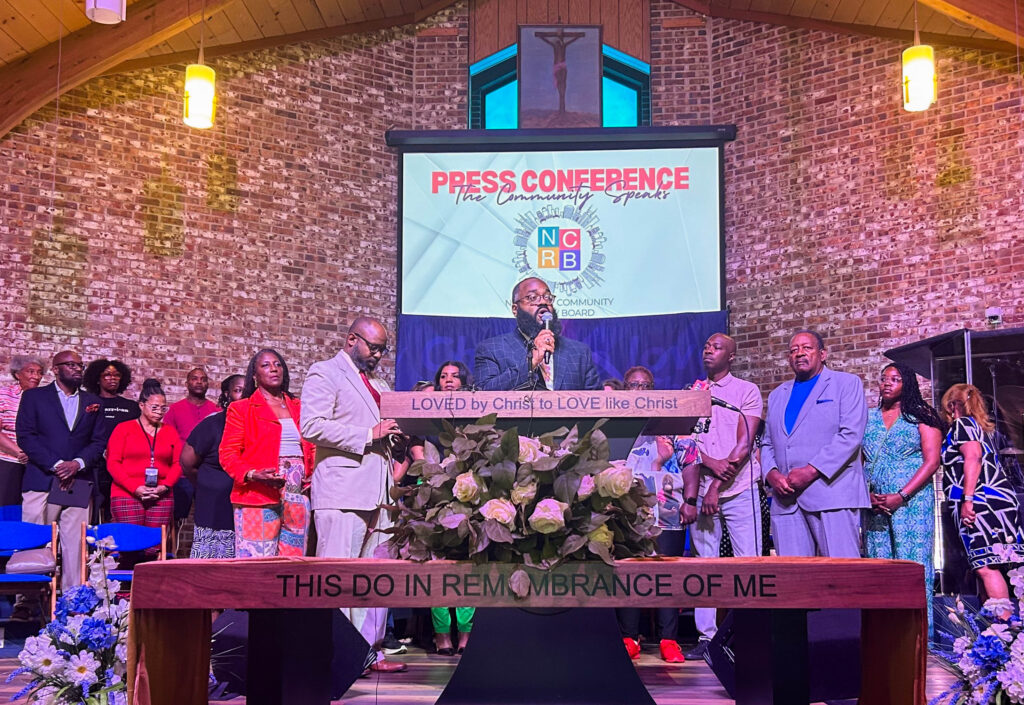
More than a dozen local activists and faith leaders gathered behind the altar of the Jefferson Street Missionary Baptist Church to speak in support of Nashville’s Community Review Board. The group included representatives from the Nashville branch of the NAACP and Community Oversight Now, as well as Sheila Clemmons Lee, whose son Jocques Clemmons was shot and killed by a Metro Nashville Police officer in 2017.
“As you’ve seen with this group behind me, community leaders are not comfortable with what’s going on,” said Aaron Marble, who serves as the church’s senior pastor and as president of the Interdenominational Ministers Fellowship.
Late last month, a retired Metro Nashville Police lieutenant alleged that at least two top police officials worked with state lawmakers to dissolve the board charged with keeping them accountable — and claimed that the department’s leadership, including Police Chief John Drake, knew about it. In 2023, the Tennessee legislature passed a new law banning oversight boards, forcing Nashville’s oversight group to rebuild as a less-powerful review board. In a complaint filed against the department, retired lieutenant Garet Davidson claims that high-ranking MNPD officials helped work on this law, and that one deputy chief even received an award for his efforts.
The future of Nashville’s Community Review Board
These allegations have derailed ongoing negotiations between MNPD and the review board for a new memorandum of understanding, which will define their working relationship and outline the extent of the board’s powers moving forward.
“We are calling truth to power and saying that there must be a change,” Marble said. “We would like our mayor and city leaders to work expeditiously to ensure that an MOA is reached — that the CRB can do its work and do it well.”
Jill Fitcheard, who has led the board since 2019, said that some of the people that they have been negotiating with are named in the complaint.
“People who sat at the table with us and negotiated with us in good faith, who looked in my face and called me on the phone and talked about how well we were doing and how they wanted to do this work together,” she said. “And it was all, allegedly, lies.”
The review board has received a second complaint from a current MNPD officer that corroborates portions of Davidson’s 61-page complaint, according to Fitcheard. She added that she has set up a confidential hotline for other police employees to share their concerns with the board, and is working with the Lamplighter Project, a group focused on whistleblowers in law enforcement.
Metro Legal has brought in outside counsel to investigate Davidson’s full complaint. Ed Stanton is a Memphis-based attorney who specializes in internal investigations, and previously served as the U.S. Attorney for the Western District of Tennessee after being nominated by then-President Barack Obama. In 2022, he led a review of the state’s use of lethal injections, uncovering findings that shocked officials and advocates.
The history of police oversight in Nashville
Timothy Hughes, who serves as the vice president of the local chapter of the NAACP, pointed out that Nashvillians have been fighting for a police oversight board for half a century. The idea of oversight boards is even older, dating back to at least the 1920s, and they were a key demand during the Civil Rights Movement of the 1950s and ’60s.
“It is important that we understand the historic connection to why Nashville has fought for some 50 years to demand accountability for law enforcement and demand transparency from this process,” he said.
More: Timeline: Nashville’s 50-year fight for a police oversight board, and how it continues today
The first push for an oversight board in Nashville was back in 1973, after two unarmed Black men were shot and killed by police. Five decades later, the police killings of Jocques Clemmons in 2017 and Daniel Hambrick and in 2018 sparked a new campaign for police accountability. In the fall of 2018, more than 134,000 Nashvillians voted to establish a Community Oversight Board.
“It has its roots in the blood of Black folks,” said Dr. Sekou Franklin, a political science professor at MTSU.

